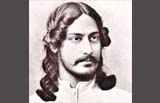 Today is the 152nd birth anniversary of Rabindranath Tagore, the man who molded the language, literature and music of the Bengal. He introduced new prose and verse forms and the use of colloquial language into Bengali literature, thereby freeing it from the rigidity of models based on classical Sanskrit. He is as great in music as in poetry, and his songs are sung wherever Bangla is spoken. His compositions were chosen by two nations as national anthems: Bangladesh’s ‘Amar sonar bangla’ and India’s ‘Jana gana mana’. He had distinguished himself as a poet, lyricist, novelist, short story writer, playwright, musician, painter, educator and social thinker. All in all, he was an experimentalist and a trailblazer. He was the first non-European to receive the Nobel Prize in 1913. Although he was deeply rooted to the soil and customs of Bengal, as a free, progressive thinker, he highly encouraged dialogue and cultural exchange between the East and the West for mutual enrichment. Yet in 1919, he renounced the knighthood he was honoured with in 1915, as a protest against the Jallianwala Bagh massacre on people in India, carried out under the British regime. Tagore was also a true humanist with abhorrence of violence and a deep commitment to social justice.
Today is the 152nd birth anniversary of Rabindranath Tagore, the man who molded the language, literature and music of the Bengal. He introduced new prose and verse forms and the use of colloquial language into Bengali literature, thereby freeing it from the rigidity of models based on classical Sanskrit. He is as great in music as in poetry, and his songs are sung wherever Bangla is spoken. His compositions were chosen by two nations as national anthems: Bangladesh’s ‘Amar sonar bangla’ and India’s ‘Jana gana mana’. He had distinguished himself as a poet, lyricist, novelist, short story writer, playwright, musician, painter, educator and social thinker. All in all, he was an experimentalist and a trailblazer. He was the first non-European to receive the Nobel Prize in 1913. Although he was deeply rooted to the soil and customs of Bengal, as a free, progressive thinker, he highly encouraged dialogue and cultural exchange between the East and the West for mutual enrichment. Yet in 1919, he renounced the knighthood he was honoured with in 1915, as a protest against the Jallianwala Bagh massacre on people in India, carried out under the British regime. Tagore was also a true humanist with abhorrence of violence and a deep commitment to social justice.
-With New Age input




















